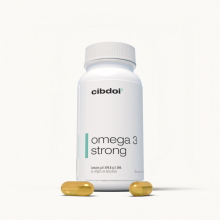Does Omega-3 Help to Bulk?
Published:
For anyone looking to gain lean muscle mass, nutrition is just as important as your training program. In addition to protein intake, omega-3 fatty acid supplementation has become a popular practice among those wanting to bulk up. But is there any truth to the claims that omega-3s can support muscle growth? Let's objectively analyze the evidence.
Contents:

An Overview on Omega-3s
Before examining the muscle building potential, let's first provide context by defining what exactly omega-3s are:
The Three Main Types of Omega-3s
There are three primary omega-3 fatty acids that are important for health:
- ALA (alpha-linolenic acid)
- DHA (docosahexaenoic acid)
- EPA (eicosapentaenoic acid)
ALA comes mainly from plant foods like flaxseeds and chia seeds. DHA and EPA primarily come from fatty fish and fish oil.
Essential Nutrients for Health
Omega-3s are termed “essential” fatty acids because they cannot be produced by the body. We must obtain them through the diet for proper health and development.
They are critical components of cell membranes and play vital roles in brain function, eye health, fetal growth, metabolism, and reducing inflammation.
Powerful Anti-Inflammatory Effects
A major reason omega-3s are so beneficial is their ability to resolve chronic inflammation throughout the body. EPA and DHA in particular have potent anti-inflammatory properties.
Now that you understand the basics on omega-3s, let's analyze the evidence on whether they can support muscle mass gains.
Mechanisms for Omega-3s Enhancing Muscle Growth
Before looking at direct clinical studies on omega-3s and muscle building, it's helpful to understand some of the proposed mechanisms for how they could aid growth:
1. Optimizing Anabolic Hormonal Response
Omega-3 intake may amplify the release of key anabolic hormones like testosterone, growth hormone, and IGF-1 in response to resistance training.
These hormones facilitate increased protein synthesis and better recovery and adaptation. EPA in particular may enhance hormonal responses.
2. Boosting Activation of Muscle Protein Synthesis
Omega-3s are thought to directly turn on muscle protein synthesis (MPS) through pathways like mTOR and P70S6K. EPA has been shown to activate MPS in clinical studies.
This enables more efficient use of amino acids for repairing and building muscle tissue.
3. Reducing Muscle Protein Breakdown
Omega-3s may attenuate catabolic processes like breakdown of muscle proteins. Reducing protein breakdown spares muscle tissue.
This anabolic effect complements the potential to heighten protein synthesis.
4. Decreasing Chronic Inflammation
The anti-inflammatory properties of omega-3s may optimize anabolic processes by resolving chronic low-grade inflammation in muscle, fascia, joints, and tendons.
Lowering inflammation helps muscles fully recover between workouts.
In summary, omega-3s may augment muscle growth through both hormonal optimization, direct MPS effects, lowering protein breakdown, and mitigating inflammation. But what does the clinical evidence show?
Findings from Clinical Studies on Muscle Growth
While the mechanisms outlined provide plausible theories for omega-3s enhancing hypertrophy from training, do the actual clinical studies support this? Let's review the evidence.
Correlational Population Data
Some large observational studies show positive associations between omega-3 intake and greater muscle mass and lean body mass percentage.
However, correlational data cannot prove cause and effect. Confounding factors may be involved. Controlled trials are more informative.
Clinical Trials in Untrained Individuals
A few trials have studied the effects of omega-3 supplements coupled with a resistance training regimen in untrained adults.
Some, but not all, of these studies have found significantly greater increases in muscle strength and size in groups supplementing with omega-3s from fish oil versus placebo groups.
Clinical Trials in Athletes/Bodybuilders
Other studies have focused specifically on trained athletes and bodybuilders undergoing programs to increase muscle mass.
Again, some of these report significantly augmented lean mass gains, hypertrophy, strength increases, and body fat loss in subjects taking omega-3s versus controls. But other studies show no differences.
Limitations of Current Research
While some trials are positive, overall results are mixed. Limitations like small sample sizes, short study lengths, and relying on less sensitive body composition methods hamper the ability to draw firm conclusions.
More robust, long-term clinical research is still needed to clarify if omega-3s meaningfully impact muscle growth in trained individuals.
Potential for Greater EPA/DHA Doses
One issue may be insufficient doses of omega-3s used in studies. Effects may depend on achieving high blood levels of EPA/DHA.
Doses of omega-3s in exercise studies are often only 1-2 grams per day. But effects may be more likely with higher intakes of 2-5+ grams providing >3g combined EPA/DHA.
Higher blood levels may be necessary to alter hormonal responses, inflammation, protein synthesis, and other muscle building mechanisms.
This could explain some conflicting findings if doses used were too low to significantly impact mass and strength gains. More research on optimal dosing strategies is warranted.
Anecdotal Evidence from Bodybuilders
While robust clinical evidence is lacking, many professional and recreational bodybuilders report noticeable benefits on muscle development, body composition, and workout recovery with higher dose omega-3 supplementation of 3-5+ grams EPA/DHA daily.
These types of real-world anecdotal reports can be insightful, but placebo effects are also possible. Controlled trials remain most reliable.
Potential Concerns with Very High Doses
It should be noted there are also some potential drawbacks associated with excessive intake of omega-3s:
- Increased bleeding risk at very high doses
- Impaired immune function
- Negative effects on glucose metabolism
- Gastrointestinal side effects like fishy burps
Aim for enough to achieve benefits, but don't megadose. 2-5 grams combined EPA/DHA daily appears reasonable if using a high quality supplement.
Additional Lifestyle Factors for Gains
While omega-3 intake may provide small benefits, other training and lifestyle factors likely have much larger effects on muscle growth, including:
- Progressive overload training principles
- Getting sufficient total calories/protein
- Managing training volume and recovery
- Prioritizing sleep quantity and quality
- Staying well hydrated daily
- Reducing stress levels
Be sure to address these fundamentals before expecting any supplement to significantly impact your ability to gain quality lean mass.
Conclusion
To summarize, the current evidence for omega-3s enhancing gains in muscle size and strength is mixed and inconclusive:
- Plausible mechanisms exist like optimizing hormones, mTOR activation, inflammation, etc.
- Some lower quality trials show benefits, but many are non-significant
- Positive anecdotal reports, but placebo effect is possible
- Insufficient dosing in studies may limit findings
- Effects likely small compared to training principles, diet, lifestyle
While more research is warranted, omega-3s likely only provide minor adjuvant support at best currently based on the available data.
They may offer a small boost when adequately dosed, but smart training programming, nutrition, recovery, and lifestyle practices will account for the vast majority of your ability to successfully bulk up.










